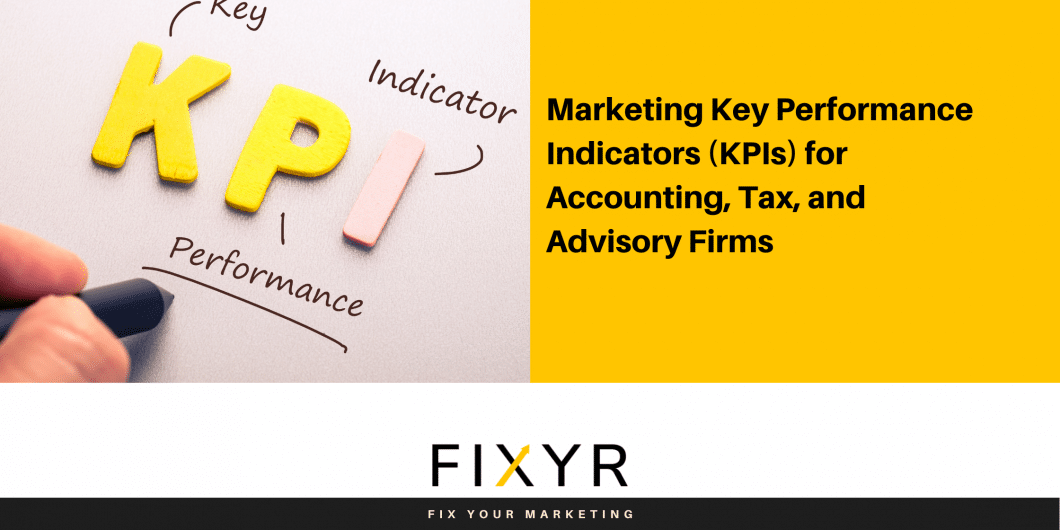Marketing KPIs for Accounting, Tax and Advisory Firms

It is very easy for new marketers or even those of us that have decades of experience to get caught up in the latest hype. Nowhere is this more true than with digital marketing. So-called "guru's" are popping up every week, each espousing a different program, method or technology.
What's an accounting marketer to do?
At the end of the day, what astute marketers know to be true is that the core marketing Key Performance Indicators (KPIs) for accounting firms never change. Regardless of which technology you are currently using you should continue to track the core KPIs.
The Core Marketing KPIs for Accounting, Tax and Consulting Firms
While there are many different KPIs that you could be tracking, there are a core set of marketing KPIs that all accounting, tax, and consulting / advisory firms should be tracking. We call these the "Core Marketing KPIs".
The core marketing KPIs for accounting firms fall into two categories,
1) Generating new business, and
2) Growing your customer base
The core marketing KPIs will align your marketing focus to lead generation, sales, and customer growth.

I. Generating New Business KPIs
If you track nothing else, your accounting practice, boutique tax firm, or advisory consultancy should be tracking these two KPIs on a regular basis (weekly or at least monthly).
- KPI # 1 Leads
- KPI #2 Conversions
KPI #1) Leads - How many leads you generated
This is by far the single-most important KPI you should be tracking in marketing. You should regularly track and analyze how many leads you generated. Many firms have difficulty tracking this, including large multi-billion dollar firms that we've worked with. If you are not tracking and reporting leads generated make this your number one focus.
Analysis - The Leads KPI provides you a measure of how well the top of your marketing funnel is performing. After all, the purpose of marketing is to generate leads or revenue opportunities for the business.
You can further analyze this KPI by the number of leads by source, and your cost per lead.
- Are we generating enough leads?
- Are we generating leads consistently?
- Which channels, activities or campaigns are delivering the most leads?
- Which channels, activities or campaigns are the most cost efficient at generating leads?
These are very valuable metrics for benchmarking your performance across different marketing campaigns and tactics to determine what is working, what isn't and where there can be opportunities to improve efficiencies in spend versus results.
KPI #2) Conversions - How many of those leads converted into sales
Once you have begun tracking the number of leads generated, you should track how many of those leads converted. Ideally you want to be able to track how many converted into sales or purchases, but depending on your sales process you could also track conversions from leads to qualified leads, leads to meetings or appointments, leads to discovery sessions, leads to proposals, and percentage of proposals won.
Analysis - The Conversions KPI provides you with insight into the quality of your leads and how well your sales process is working. Often we find that accounting or consulting firms may be performing reasonably well at generating leads, but that their sales process is ineffective at converting those leads. If that is the case, generating more leads will not help you, you will need to focus on improving your sales process and your conversions at each step.
- What is the quality of the leads we are generating? or, Are we generating the right types of leads that are likely to convert?
- How effective are we at moving leads through our sales pipeline?
- How many of our leads convert into qualified leads that have demonstrated interest in doing business with us?
- How many leads are we having calls and / or meetings with?
- How many leads do we end up sending proposals to?
- How many of our qualified leads do we submit a proposal to?
- What is our win rate on proposals submitted?
- If we are not converting leads, do we know why?
- Do we need to do anything to improve each step of our conversion process?

II. Growing Your Customer Base KPIs
While the first set of core marketing KPIs are about generating new business, the second set of core marketing KPIs are all about your customer base (for simplicity we are using the terms Client and Customer interchangeably).
Core Customer Growth KPIs
- KPI #3) Client retention
- KPI #4) Revenues per client
Note: Some accounting firms don't see customer growth or customer success as the domain of marketing. This could fall to the practice lead or senior partner for the customer's business. The scope of this article is not to debate the role of marketing within accounting firms. Wherever the responsibility lies within your organization Marketing should take responsibility to ensure that you have the right core KPIs for growing your customer base in place.
KPI #3 - Client retention
This core customer growth KPI is pretty straight-forward. It is simply a measure of how many customers you currently have compared with how many you had in the previous period.
Analysis - It is much more difficult and expensive to attract and win new customers than it is to maintain your revenues from your existing customers. Yet often many firms do not closely analyze and / or benchmark their performance in customer retention.
- How many customers are staying with us, period-over-period?
- Do we have more customers now than we did last year/month?
- How many new customers did we bring onboard versus how many we lost?
- Is our customer growth occurring in the target industries or customer types that we want?
- If we are losing customers, do we know why?
- What should we be doing to increase our customer retention rates?
KPI #4 - Revenues per client
Generally speaking we have found most accounting firms to be efficient at tracking client profitability. For Marketing purposes though we want to be able to understand what our opportunities are for increasing revenues from our existing customer base.
Analysis - Many large, established firms find that they can steadily grow revenues and profitability without requiring expensive marketing spend to bring in new customers by focusing on mining their existing customer base.
- How profitable is each client?
- What is our cost to generate new clients versus the amount of revenues or profits we are generating from each client?
- What opportunities do we have to increase reveues with our existing clients? Can we sell additional services (cross-sell or upsell)?
- How well do we understand how we provide value to our customers?
- What additional services can we offer to our existing customers that we are not currently offering as a firm now? Do we know what our customers are looking for?
- Is our pricing in-line with the market? Is our pricing reflective of how we want our firm to be positioned (e.g. low cost + high efficiency, premium etc.)?
What about Leading Indicators?
The challenge that we face is that the KPIs above are all "lagging" indicators - that is you can't measure them until after the associated activity has happened - and so marketers are constantly attempting to come up with "leading" indicators.
These will vary by firm and by campaign but what we have found to be insightful is a combination of audience (size and quality) and engagement, but only when the two are used together.
A Word of Caution: Whichever leading indicators you choose, never lose sight of your core marketing KPIs. Many so-called marketers will report on audience metrics from social media platforms or advertising but these measures should only ever be considered within the context of your core marketing KPIs above. Growing audience provides zero marketing value to the firm unless that audience is also turning into leads, those leads are converting into customers, and you are retaining and growing your customers.

Using the Core Marketing KPIs in Your Accounting, Tax or Consulting Practice
The accounting and consulting sector is rapidly changing and growing more complex with the development of new marketing technology that has resulted in widespread productivity improvements. However, this means that tracking performance using marketing KPIs is more important than ever. Marketing leaders must metrics to track how well their department is performing rather than just tracking the latest digital metric. While this article explains the recommended core marketing KPIs, you may want to consider how you specifically apply them within your company.
Take the following important factors into consideration:
- Define Associated SMART Goals – Every marketing KPI should have a goal in mind that is SMART: specific, measureable, attainable, realistic and timely. This will allow you to track your progress as your organization gets closer to achieving its goals.
- Track Your Progress – Seeing your KPIs move closer to your goals shows that changes you are making are improving performance. If they are moving in the other direction, it could mean that process changes are having the opposite effect and should be revisited.
- Aligned with your Marketing Strategy – Marketing KPIs need to be aligned with your firm's marketing strategy and your processes for implementing your plans. Creating additional work for the sake of a new KPI is counterproductive.
- Context – KPIs need to be evaluated within the context of your organization as a whole. It can be difficult to control KPIs that are easily influenced by external forces.
- Reliable Data – KPIs are only as good as the data that are used as inputs. Marketing analytics dashboards and CRM software can help you retrieve, analyze and report data to be used as inputs for your marketing KPIs.
Now that you have learned about the core marketing KPIs for accounting, tax and consulting / advisory firms, you have made the first step to improving your organization’s marketing performance. We encourage you to speak with one of our experts who would be happy to provide guidance on how to best implement the key performance indicators mentioned above.
Related Resources
